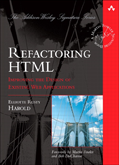Dn’t Abbrvt
Wednesday, April 28th, 2010Is req a request or a requisition?
Is res a response, a reservation, a resume, or a result?
Is def a default or a definition?
Is rng a range or a random number generator?
Is v1 version 1 or value 1?
Is e an event, an entity, or an exception?
Is f a file or a float?
Is lst a list or the least value?
Is temp a temporary variable or a temperature reading?
Is rep a representation, a representative, a repetition, or a reputation?
Is tm a time or a trademark? Or even another temporary variable? And if it is a time, is it a timestamp, a time of day, or a duration? (These are three very different things.)
Is admin an administrator, an administrative assistant, or a system administrator?
In context, you can usually figure these things out, but you have to think about them. That’s inefficient. Far better to just spell out what you mean from the get go.
(more…)
